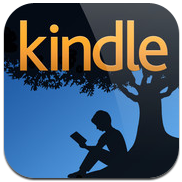‘Kindle’ eBook App
 ‘Kindle’ eBook (iPhone/iPad): I didn’t go out and buy a Kindle when they first appeared, but I wanted to. At the time we were testing the Sony eReader at work so I borrowed one of those for a couple of weeks, which I didn’t like (mainly due to hassle of connect-to-upload and software issues, but it was still OK to use).
‘Kindle’ eBook (iPhone/iPad): I didn’t go out and buy a Kindle when they first appeared, but I wanted to. At the time we were testing the Sony eReader at work so I borrowed one of those for a couple of weeks, which I didn’t like (mainly due to hassle of connect-to-upload and software issues, but it was still OK to use).
Since then the Kindle and other eBook readers have come along way. The new look Kindle Touch, B&N Nook and the new Kobo available in the UK WH Smiths are all impressive devices, but they still do not have the overall functionality of the iPhone or iPad (except the Kindle Fire, which is still not in the UK yet! Grrrr!).
And so to the Kindle App for iPhone and iPad:
“The Kindle app is optimized for the iPad, iPhone, and iPod touch, giving users the ability to read Kindle books, newspapers, magazines and PDFs on a beautiful, easy-to-use interface. You’ll have access to over 900,000* books in the Kindle Store. Amazon Whispersync automatically syncs your last page read, bookmarks, notes, and highlights across devices (including Kindle), so you can pick up your book where you left off on another device. ”
Kindle Free : http://itunes.apple.com/gb/app/kindle/id302584613
I recently read and finished the complete Douglas Adams Hitchhikers Guide to the Galaxy which I bought for the Kindle and downloaded on both iPad and iPhone. Depending on where I was and what device I had available I read the eBook in about a week (yes, I’m a fast reader when I enjoy the book). Whist I downloaded the Kindle App about a year ago this was the first paid-for book I’d read on it and the experience was great – it was easy, enjoyable, I could pick it up for a page or chapter or two at a time, etc, etc.
Why am I including this as an App in learning and teaching list? Here’s why:
- Sync (Whispersync) – the ability to save progress in any book on any device that is running the Kindle App (including your laptop/desktop) and advance to this point when you pick up another device and want to continue reading from where you stopped.
- Publishers are becoming more accepting of the format of electronic books, so expect to see versions available in different formats, including EPUB, in the future. In which case the Kindle and Kindle App will be an excellent choice.
- One advantage I can see about using Kindle and Amazon in general (whether it is using an Amazon device or just the App) is the ability to send documents to your account and device via email – “Email PDFs & other documents to your new Send-to-Kindle e-mail address and we deliver them to your device. The documents are automatically archived in the Amazon Cloud and available for re-download on your iOS or supported Kindle devices.” If Schools are not using this when they give these devices to students to get learning materials to the students then they are missing a HUGE trick – I would if I was involved in that kind of project!
- Scale the text to the size that suits your eyesight, and even change the background from white to ‘paper’, even white text on black for night-time reading.
- Simple touch the screen to progress/turn the page, or you can swipe to turn.
- Access to massive Amazon eBook store (+900k reportedly available).
- Dictionary – tap and hold a word to view the definition (dependent on connection).
Other resources you should look at about Kindle and eBooks:
- James Clay eLearning Stuff – podcast with Lilian Soon, David Sugden and Ron Mitchell
- eLearn magazine – “Moving From Paper to E-Book Reading”
- Zak Mensah – “eBook Testing Kit”
Are you using a Kindle or the Kindle App (or both)? How are you using ‘them’, and are you involved in a scheme whereby the students are given one (or an account) and you send them the documents they need instead of them downloading from the VLE?























There is some anecdotal evidence that people with dyslexia find eBooks easier to read than printed books. I am currently conducting research into whether this is true and if so what features of an eBook give these advantages. I would love to know your views on this or the views of any of the readers of your blog (especially any adults with dyslexia).
Hi Dave – how did your study into dyslexia & eBooks go?
All the best, David